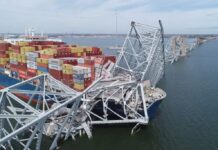
Two freight railroads have been waging a bad-faith effort to kill the incredibly popular, fully funded, multi-state effort to restore long-awaited passenger rail service along the Gulf Coast, in part because the precedent could stall the infrastructure law’s historic investment in the country’s passenger rail network which would give millions more Americans access to regular rail service.
We’ll start this story with a video. Take a minute and watch this short video of a day of freight trains passing through “busy” Mobile, AL:
Freight companies Norfolk Southern (NS) and CSX are hoping that no one looks too closely or counts how many freight trains are actually passing through Mobile each day. Why? Because they are trying to convince the federal Surface Transportation Board that Amtrak adding just two passenger trains per day between New Orleans and Mobile would “unreasonably impair” their (uh, “bustling”?) freight operations here. They’re trying to make the case that adding just two passenger trains per day will require an astonishing $440 million in upgrades to their existing rail infrastructure. (That’s after previously telling local officials privately in MS and AL that they only needed $140-160 million.)
So Amtrak pulled out of negotiations and petitioned the Surface Transportation Board to arbitrate the conflict.
At least on the surface, this fight would appear to be about the long-running effort to bring back new and improved passenger rail service along the Gulf Coast which was wiped out by Hurricane Katrina nearly 17 years ago. $66 million has already been committed by the states and the federal government to upgrade the corridor’s infrastructure and get these trains rolling. Stations are being renovated. Almost every hurdle has been cleared to give residents a valuable new connection and boost tourism and economic development along the entire corridor from Mobile to New Orleans.
Residents have been clamoring to see these trains return for nearly 17 years. Thousands turned out to see the Amtrak inspection train in 2016 all along the Gulf Coast:
But the freight railroads are standing in the way of those residents, trying to either delay the project to death, or take advantage of the federal government and taxpayers with far more public money than they should receive for the necessary upgrades.
What’s the fight all about here?
CSX and Norfolk Southern are fighting two meager trains per day here because they know that the precedent set by stopping this new service will make future passenger expansions elsewhere—the kind promised by the infrastructure law—more difficult.
Although freight railroads are required by federal law to share their tracks with passenger railroads—this was the deal struck to consolidate the old passenger companies, create Amtrak, and turn the trackage over to freight companies—freight railroads have to work together with Amtrak to invest in rail infrastructure and balance their operations. But CSX and NS have been negotiating in incredibly bad faith all along the way, producing wildly fluctuating numbers (from $140 million up to $2.3 billion depending on which day you ask them) about the level of investment required to add just two short passenger trains per day. Federal law says that freight railroads can only seek the infrastructure improvements required to facilitate passenger service. (Otherwise, they’d be fleecing American taxpayers, taking public money for their own private gain.)
T4America chair John Robert Smith, a former Amtrak board chair and Mayor of Meridian, MS, testified before the STB this week about the level of misbehavior from the freight companies. It’s worth excerpting heavily:
I take no pleasure in telling you that throughout the effort to restore passenger rail, CSX railroad has been neither transparent nor completely honest in dealing with the SRC, Amtrak and the Federal Railroad Administration as you heard from the FRA earlier today. CSX withheld even the most basic information about their operations from all involved, even from the FRA. …CSX grossly inflated infrastructure costs providing no supporting documentation or transparency in the development of these costs. As lack of facts and misrepresentation failed them, CSX has resorted to intimidation and fear to ports and shippers alike, as we have seen demonstrated today. I believe this has all been an effort by CSX to kill any additional passenger rail service along the Gulf by torturous delay.
Death by delay must not become the order of the day, for to do so would extinguish any aspiration for expanded passenger rail connecting our country and its people.

What’s at stake with this decision?
The Surface Transportation Board is an independent federal agency that regulates some surface transportation modes including freight rail. When private interests bump up against the public in decisions like this, the STB hears and decides the disputes, like a private arbitrator.
If the freight railroads lose this decision, which is looking increasingly likely, one reason will be the diverse coalition of public, private, and political support lining up behind the popular Gulf Coast project and making persuasive arguments to the STB.
Senator Roger Wicker (R-MS) has been this project’s biggest champion from day one. He teamed up with Senator Cory Booker (D-NJ) to include rail policy and funding in a long-term federal transportation law for the first time in 2015’s FAST Act. He has since appropriated money to support the Southern Rail Commission which has done the legwork to get all three states on board with matching state funds to operate the new rail line. Other political leaders from all three states have been instrumental. The local business community is ecstatic. Residents lined up by the thousands to see the inspection train roll through in 2016. Rep. Peter DeFazio, who chairs the House Transportation and Infrastructure Committee in the House, also provided testimony during this week’s public hearing.
But perhaps most notably, the USDOT and Federal Railroad Administration (FRA) itself have gotten heavily involved. Their own filing urged the STB to rule against the railroads because CSX and NS are asking the STB “for an unduly restrictive interpretation…that lowers the bar for demonstrating ‘unreasonable impairment’ [of freight service] below what Congress required.” FRA Administrator Amit Bose testified this week about the importance of the STB continuing to require freight railroads to follow federal law and provide Amtrak the use of their track for passenger service.
“The outcome of this proceeding will be pivotal to the future development of inner-city passenger rail in this country. The Gulf Coast has been without passenger rail service for nearly two decades and in this case, service delayed is service denied,” said Administrator Bose.
Other than CSX and NS, the Port of Mobile has been opposed to this project, supposedly on the grounds that it would impact their operations—concerns which have been repeatedly proven false as the train won’t even enter port property. Alabama Senator Richard Shelby may think he’s only carrying the water for the unhappy Port of Mobile, but his letter to the FRA on the port’s behalf asking them to rule in favor of the freight railroads lays out what the freight railroads are truly concerned about and what’s at stake with this decision. (bold ours)
“In sum, a decision by the Board to mandate Amtrak service in this case will have significant consequences for the national rail network and supply chain, as well as set a precedent for expansion of Amtrak service. We urge you to uphold the Board’s long-standing commitment to an efficient and reliable rail network.”
A collection of monied status quo interests do not want residents of the Gulf Coast to say “Y’all Aboard!” They definitely do not want to see a precedent that would clear the way for the bipartisan plan to pump $102 billion into passenger rail service across the country. They absolutely do not want to see more groups like the Southern Rail Commission on the Gulf Coast created and encouraged to cast a vision, tap into latent demand from residents for new transportation options, and build public/private and political support for new service on other corridors across the country, which was one of the IIJA’s best provisions on passenger rail. From our explainer about the rail provisions in the infrastructure law:
It creates a new program that incentivizes up to ten interstate rail compacts—like the Southern Rail Commission at the center of Gulf Coast expansion—that are vital for developing and realizing a regional and national rail network. Interstate rail compacts are made up of contiguous states that want to establish a vision for and seek investments for intercity passenger rail in their region. …The bill allows for these ten commissions to apply for up to $1 million annually to operate their respective commissions.
What’s next?
The Surface Transportation Board is likely to reach a final decision in March or April. Stay tuned.
Their decision will have far reaching consequences.
As Mayor John Robert Smith closed his testimony to the STB earlier this week, “send a strong message that it is time that passenger rail became an important part of America’s future. That it is time to reconnect our cities of the Gulf with passenger rail and the economic opportunities that it brings.”
The post Rail barons return: How two freight railroads are trying to derail the infrastructure law’s historic investment in passenger rail appeared first on Transportation For America.












